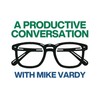
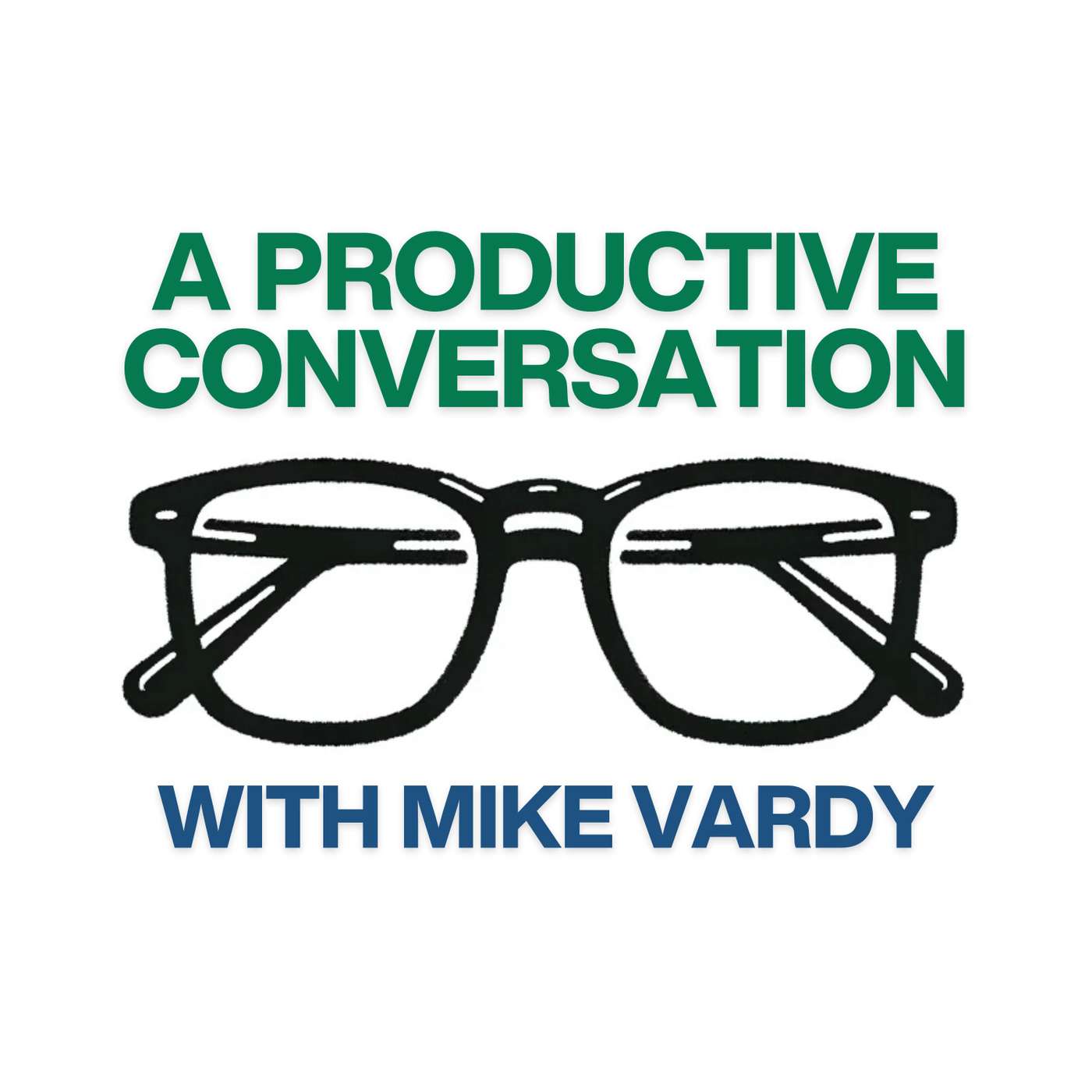
A Productive Conversation
Mike Vardy
Hosted by productivity strategist Mike Vardy, A Productive Conversation offers insightful discussions on how to craft a life that aligns with your intentions. Each episode dives into the art of time devotion, productiveness, and refining your approach to daily living. Mike invites guests who are thinkers, doers, and creators to share their strategies for working smarter and living more intentionally. From practical tips to deep dives on mindset shifts, this podcast will help you reframe your relationship with time and find balance in a busy world.
Subscribe and join the conversation—because a productive life is more than just getting things done.
Subscribe and join the conversation—because a productive life is more than just getting things done.
Episodes
Mentioned books
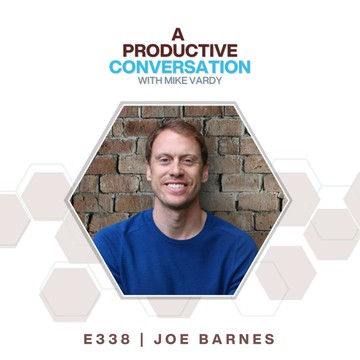
Oct 1, 2020 • 34min
Escape From Boring with Joe Barnes
After reading a comment on YouTube about how to earn a good income without a boring job, today’s guest Joe Barnes made it his mission to find a framework that enables this. Hint: there are three ways.
When I left my full-time job at Costco, it felt like a giant leap. So I was excited to have Joe Barnes on the show to hear more about his Three Paths to pursuing your dream job. He set up Escape The System – a resource for entrepreneurs, dreamers, and world-changers. He’s also the author of Do The Work You Love. By freeing your mind from society’s conditioning and finding a passion, you’re on track to living the life you want.
Tune in as we learn how to escape boring jobs, how he strategically became an author – his dream job – and what he learnt from two ridiculous tennis matches.
Talking Points
The boring job Joe did
What do we actually mean by “choosing your passion”?
The Three Paths
Advice to the adventurous who go ‘all-in’ with a change
How to stop your passions from fizzling away
Dealing with fear when making the career change
Advice to people who think it’s ‘past their time’
Lessons learnt from being a tennis coach
Joe’s relationship with time
Quote
“There’s something inside of you that needs expression.”
Helpful Links
Do The Work You Love | Amazon
Episode 229: Exploring Digital Minimalism with Cal Newport
Episode 73: Deep Work with Cal Newport
So Good They Can’t Ignore You | Amazon
‘Follow Your Passion’ Is Bad Advice
Beau Carnes’ blog post
Episode 251: Being a Late Bloomer with Rich Karlgaard
Episode 234: Bolder with Carl Honoré
What 2 Ridiculous Tennis Matches Taught Me About Mental Toughness And Life
The Inner Game of Tennis | Amazon
The Score Takes Care of Itself | Amazon
EscapeTheSystemNow.com
Screw The System YouTube Channel
Joe’s Instagram
Want to discover some of the books mentioned on the podcast? Check out Scribd, my reading app of choice.
If you enjoyed the episode, please leave a rating and/or review wherever you listened to the episode. Also don't forget to check out all of our podcast sponsors found on our podcast sponsors page.
And if you want to have easy access to the archives of the show and ensure you don't miss the new episodes to come then subscribe to the podcast in the app you're using.Learn more about your ad choices. Visit megaphone.fm/adchoices
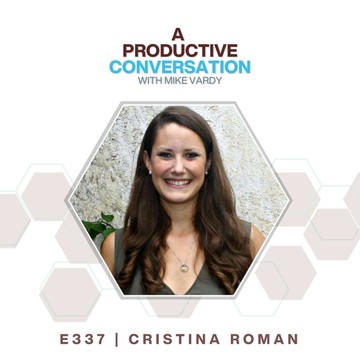
Sep 24, 2020 • 42min
Working Deeply with Cristina Roman
Deep work can easily feel overwhelming, so we put it off. In this episode we dissect how you can make it meaningful to you, and apply it to any area of your life.
We’re only human – we can’t achieve everything on one single day. Instead, it takes steady increments that lead us to the desired results. Today’s guest Cristina Roman has taught her clients this very philosophy. She’s a Certified Life Coach, deep work extraordinaire, and coaches clients on overcoming procrastination.
By small actions, and focusing on results, we get deep into the good stuff, and less of the procrastinating tasks. Tune in as we unpick her favourite books, second order thinking, and why ‘prudence’ is my word.
Talking Points
Getting into a deep work state within 15 minutes
Stand out learning from Cal Newport’s book ‘Deep Work’
Overcome deep work overwhelm
Apply deep work to your personal life
Deep work for group tasks
Using evidence to beat procrastination
How our language impacts our beliefs and behaviours
How much procrastination can you “afford”?
The fear of making the “right or wrong” decision
Actionable steps to move away from procrastination
Quote
“Slow down to speed up.”
Helpful Links
PiqueCoaching.co/DeepWork
Deep Work | Amazon
The Life Coach School
Atomic Habits | Amazon
Episode 227: Why You Need Atomic Habits with James Clear
Episode 266: Becoming Indistractable with Nir Eyal
Second-Order Thinking: What Smart People Use to Outperform
Ziva Meditation
Muse Meditation
Stress Less, Accomplish More | Amazon
Want to discover some of the books mentioned on the podcast? Check out Scribd, my reading app of choice.
If you enjoyed the episode, please leave a rating and/or review wherever you listened to the episode. Also don't forget to check out all of our podcast sponsors found on our podcast sponsors page.
And if you want to have easy access to the archives of the show and ensure you don't miss the new episodes to come then subscribe to the podcast in the app you're using.Learn more about your ad choices. Visit megaphone.fm/adchoices
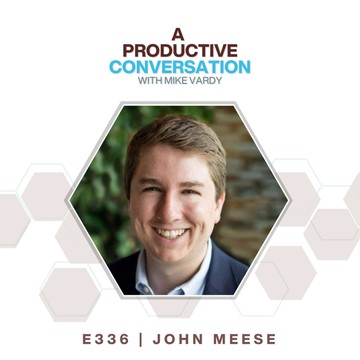
Sep 17, 2020 • 40min
Visibility Bias with John Meese
We’ve all experienced social media overwhelm – what would it be like if you removed it from your marketing strategy? John Meese joins the show to share what he’s learnt from having no social media.
Today’s guest John Meese has found something liberating: removing social media from his marketing equation. When done well, social media works, but it’s easy to get distracted by vanity metrics. After a social media detox, John discovered the best places to serve his audience online.
I’m a huge fan of John’s entrepreneurship, so I was excited to learn more about his work with Michael Hyatt. He is the Dean of Platform University, cofounder of Notable Themes and CEO of Cowork Columbia. He is also the author of Survive and Thrive: How to Build a Profitable Business in Any Economy (Including This One) which will be available this fall.
Join us as we discuss the power of email, visibility bias, how to focus on the ‘who’ – and what his priest taught him about productivity.
Talking Points
Why John doesn’t use social media
Should you claim your brand name across all social media channels?
What kind of platform is YouTube?
How to start weaning off from social media?
Why email has stood the test of time
His work at Platform University
John’s relationship with time and productivity
Quote
“Macro-dream and micro-execute”
Helpful Links
Digital Minimalism | Amazon
Productivityist’s TikTok
Episode 239: Free to Focus with Michael Hyatt
Episode 289: The Vision Driven Leader with Michael Hyatt
Platform University
Platform | Amazon
Cowork Columbia
The Roosevelt Rule
PlatformUniversity.com/Productivityist
Want to discover some of the books mentioned on the podcast? Check out Scribd, my reading app of choice.
If you enjoyed the episode, please leave a rating and/or review wherever you listened to the episode. Also don't forget to check out all of our podcast sponsors found on our podcast sponsors page.
And if you want to have easy access to the archives of the show and ensure you don't miss the new episodes to come then subscribe to the podcast in the app you're using.Learn more about your ad choices. Visit megaphone.fm/adchoices
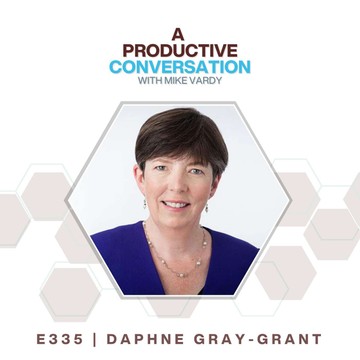
Sep 10, 2020 • 47min
Mind Map Your Writing with Daphne Gray-Grant
We all need to write more crappy first drafts – that’s the way to truly get unstuck from writing. In this episode I learn from Daphne Gray-Grant about her inspiring writing process.
From my experience of writing a book, I know the process can easily get overwhelming. Which is why I was refreshed to hear about the need to write “crappy first drafts” from today’s guest, Daphne Gray-Grant. Aside from being a prolific writer, Daphne is also a coach to many writers who want to learn to write faster, better. She started her career in the newspaper business and quickly learnt that 80% of your writing is the process you have set up – 20% is the actual writing.
Tune in as we explore the lessons she’s taught to hundreds of her clients. We discuss mind mapping techniques, the joy of paper, and her love for treadmill desks.
Talking Points
On treadmill desks and Daphne’s love of walking
The draw to editing
Daphne’s writing mindset and routine
Is there a good timeline for writing a book?
Ways to beat mind map overwhelm
The impact of writing by keyboard vs by hand
Who can benefit from dictations?
The most common mistakes people make when mind mapping
Quote
“A mind map is not an outline nor an organizational tool – it’s an inspirational tool”
Helpful Links
Episode 288: How to Be Awesome at Your Job with Pete Mockaitis
Daphne Gray-Grant’s interview on ‘How To Be Awesome At Your Job’
Gabriele Rico’s Clustering
Writing the Natural Way | Amazon
Episode 238: How to Keep Going with Austin Kleon
GoodNotes
iThoughts
Scapple
Scrivener
Drafts
PublicationCoach.com
Want to discover some of the books mentioned on the podcast? Check out Scribd, my reading app of choice.
If you enjoyed the episode, please leave a rating and/or review wherever you listened to the episode. Also don't forget to check out all of our podcast sponsors found on our podcast sponsors page.
And if you want to have easy access to the archives of the show and ensure you don't miss the new episodes to come then subscribe to the podcast in the app you're using.Learn more about your ad choices. Visit megaphone.fm/adchoices
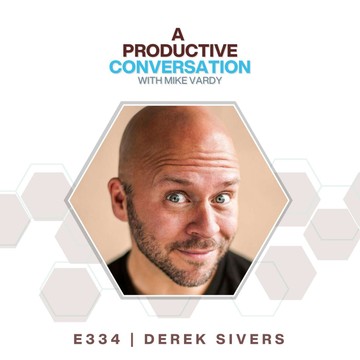
Sep 3, 2020 • 54min
Endless Curiosity with Derek Sivers
Derek Sivers, a multifaceted writer, musician, and founder of CD Baby, explores the essence of living a good life based on years of curiosity and his nomadic experiences. He discusses the inspiration behind his upcoming book, 'How To Live,' emphasizing that there's no singular way to be happy. Sivers believes that creativity thrives under constraints and highlights how our perception of time is deeply personal. He also shares thought-provoking insights on life phases, joy in productivity, and his relationship with email—peppered with humorous Star Wars references.
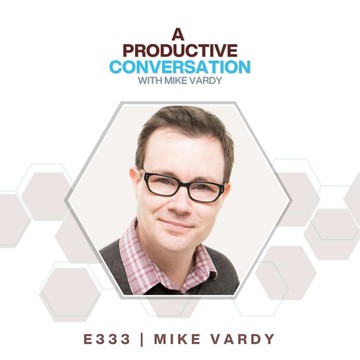
Aug 31, 2020 • 17min
Happy Now Year!
On this solo episode of the podcast, I talked about I’m ending one year and starting another – as well as everything that comes along with that.
very September I kick off a new year. It’s a practice I’ve had for several years, but I’ve not used January 1st to start my year for even longer than that. I don’t believe things – like a fresh start – need to be attached to a milestone date or event. I talk about that, Sean D’Souza’s unconventional time management tips, Richard Feynman’s trip to Brazil, and more on this episode of the show.
Helpful Links
This is my $5 guarantee
Three Month Vacation: Unusual Time Management Ideas
TextExpander
A Slave to Fewer Things | The Daily Stoic
The Front Nine: How to Start the Year You Want Anytime You Want
Want to discover some of the books mentioned on the podcast? Check out Scribd, my reading app of choice.
If you enjoyed the episode, please leave a rating and/or review wherever you listened to the episode. Also don't forget to check out all of our podcast sponsors found on our podcast sponsors page.
And if you want to have easy access to the archives of the show and ensure you don't miss the new episodes to come then subscribe to the podcast in the app you're using.Learn more about your ad choices. Visit megaphone.fm/adchoices
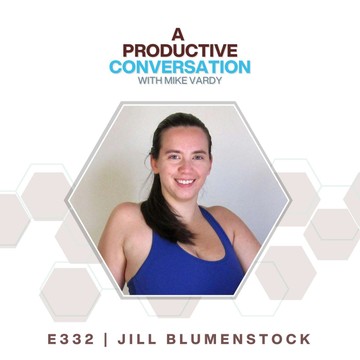
Aug 27, 2020 • 40min
Getting Productive With Astrology with Jill Blumenstock
It’s a topic so rarely discussed, but as you’ll learn on the show, tuning into your own daily and monthly astrological rhythms gives you permission for when you need to rest, work, and grow.
As you know, I’m fascinated by time and new ways of viewing it. It’s such a precious resource and a man-made construct. And this episode takes an interesting turn: astrological readings. How do the planets around us affect the way we feel?
Today’s guest, Jill Blumenstock, is a certified Yoga Teacher and Vedic Astrologer, and has seen firsthand the impact of tuning into your own natural rhythms. It’s a time guide that’s beyond just your horoscope; you learn how to best manage your time. In this episode, we uncover how to chart your astrological patterns, how to apply it to your daily life – and hear Jill’s live reading of me… I look forward to my upcoming ‘rest’ months!
Talking Points
How Jill first discovered astrology
What is Vedic Astrology?
How Jill practically applied her astrological readings to her life
Identify your cycles based on when you’re born
What is the Fourth House, and why it’s the time for rest and organising
Using the Ninth House to connect with your vision
Quote
“Astrology helps me identify what I’m feeling, so I know what to use it for”
Helpful Links
The 7 Day Circle | Amazon
Jill’s Instagram
Jill’s Facebook
JillBlumenstock.com
Want to discover some of the books mentioned on the podcast? Check out Scribd, my reading app of choice.
If you enjoyed the episode, please leave a rating and/or review wherever you listened to the episode. Also don't forget to check out all of our podcast sponsors found on our podcast sponsors page.
And if you want to have easy access to the archives of the show and ensure you don't miss the new episodes to come then subscribe to the podcast in the app you're using.Learn more about your ad choices. Visit megaphone.fm/adchoices
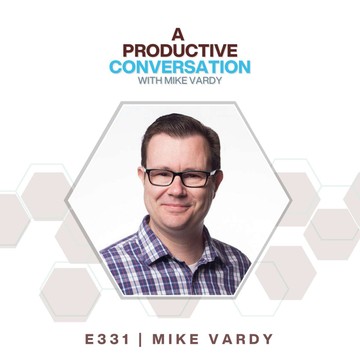
Aug 24, 2020 • 15min
It's Time to Slow Things Down
On this solo episode of the podcast, I talk about the importance of slowing things down and how that can make your productivity even better than before.
(Make sure you take part in the short experiment I start at the 8:06 mark of the episode, okay?)
Helpful Links
Carl Honoré: The Power of Slow
The Speed of Right
Why You Need to Slow Down
Want to discover some of the books mentioned on the podcast? Check out Scribd, my reading app of choice.
If you enjoyed the episode, please leave a rating and/or review wherever you listened to the episode. Also don't forget to check out all of our podcast sponsors found on our podcast sponsors page.
And if you want to have easy access to the archives of the show and ensure you don't miss the new episodes to come then subscribe to the podcast in the app you're using.Learn more about your ad choices. Visit megaphone.fm/adchoices
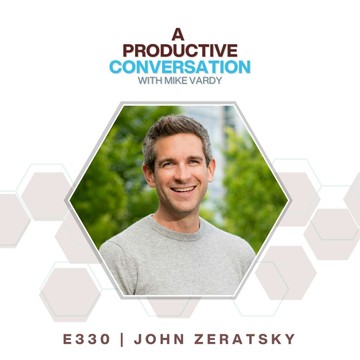
Aug 20, 2020 • 43min
Making Time For What Matters with John Zeratsky
Since the early 00s boom in productivity optimization, today’s guest John Zeratsky has seen how much our relationship with time has evolved. As a writer and speaker, John is on a mission to help people make time for what matters.
How do you manage your time? There’s no one-size-fits-all tactic, but John Zeratsky‘s latest book ‘Make Time’ runs through tried and tested approaches for us to cherry-pick, so I was super excited to catch up with him and run through some of these exercises. Tune in as we discuss reflection time, the power of default settings and breaking bad habits with friction.
John’s quest for mastering time management was born from his career in design, web development and copywriting. He’s worked with numerous startups including Netflix, Slack, Airbnb, Uber, 23andMe and Medium, and his writing has appeared in publications like Wall Street Journal, Wired and Fast Company.
Talking Points
How he formed his partnership with Jake Knapp and where their fascination of time came from
Making everything in the book simple and doable
Approaching work as a designer
Distinction between simple and easy
The role of friction and how it breaks habits
What ground hogging means to John
What is a time crater and what are the time craters John struggles with?
Taking caffeine naps to boost energy
The first productivity app John ever used
Quote
“When it comes to our own time, this finite precious resource that we have, we don’t often look back and say, what did I really do today?“
Helpful Links
Make Time | Amazon
Jake Knapp
Time Dorks
Google Ventures
Design Sprint Process
Design Sprint | Amazon
Getting Things Done | Amazon
Episode 203: The Evolution of Getting Things Done with David Allen
Episode 229: Exploring Digital Minimalism with Cal Newport
Sleep Cycle
43 Folders
Indistractable | Amazon
Philips Wake Up Alarm Clock
Austin Kleon’s caffeine nap
Mori App
TeuxDeux
MakeTime.blog
Want to discover some of the books mentioned on the podcast? Check out Scribd, my reading app of choice.
If you enjoyed the episode, please leave a rating and/or review wherever you listened to the episode. Also don't forget to check out all of our podcast sponsors found on our podcast sponsors page.
And if you want to have easy access to the archives of the show and ensure you don't miss the new episodes to come then subscribe to the podcast in the app you're using.Learn more about your ad choices. Visit megaphone.fm/adchoices
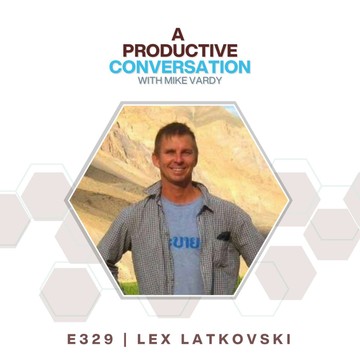
Aug 17, 2020 • 32min
This Amazing Adventure Called Life with Lex Latkovski
I usually alternate between interviews and solo episodes, but I decided to mix things up a bit this time around. Why? Because this conversation with Lex Latkovski is one I’ve wanted to get out into the world for a while now. And I felt that there was no better time than now to do so.
Lex’s mission is to have you to laugh and see the world and your life as an endless source of adventure and opportunity. He wants you to live a fulfilled life with no regrets – and to chase your dreams while you can.
Lex’s work is featured over at The Lexpedition and he’s the author of Passport Forward: Moving from Regrets and Routine to Freedom, Passion, and Adventure. He’s also a serial traveler and adventure seeker – something that isn’t as easy to make happen in 2020. Nonetheless, Lex’s message and sense of vitality were on full display during our conversation. I hope you enjoy it and it helps you – even in some small way – get more out of this amazing adventure called life!
Talking Points
Lex shares a bit about himself, our common acquaintances, and what drives him
Lex talks about what it took (and what kept him going) during his time as a zen monk
What happened when Lex was at that retreat that made him realize he wanted to do this full time?
Lex shares his thoughts on routines
Did Lex have people by his side supporting him through this process?
How does Lex deal with people who are negative in his life?
Lex talks about the experience of writing his book
Who are some of the authors that Lex has read that inspire him?
What is one thing someone can do to start this whole process? And what is one thing Lex did that he found surprisingly beneficial?
Quote
“Put it out there, instead of keeping it a secret.“
Helpful Links
The Lexpedition
Andy Traub
Episode 148: Real Artists Don’t Starve with Jeff Goins
Passport Forward: Moving from Regrets and Routine to Freedom, Passion, and Adventure
Want to discover some of the books mentioned on the podcast? Check out Scribd, my reading app of choice.
If you enjoyed the episode, please leave a rating and/or review wherever you listened to the episode. Also don't forget to check out all of our podcast sponsors found on our podcast sponsors page.
And if you want to have easy access to the archives of the show and ensure you don't miss the new episodes to come then subscribe to the podcast in the app you're using.Learn more about your ad choices. Visit megaphone.fm/adchoices


